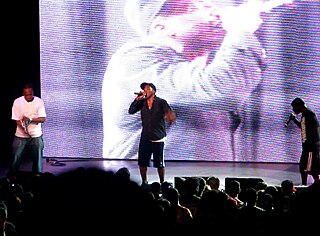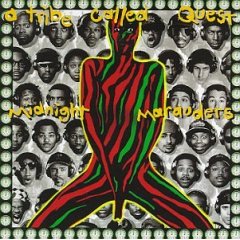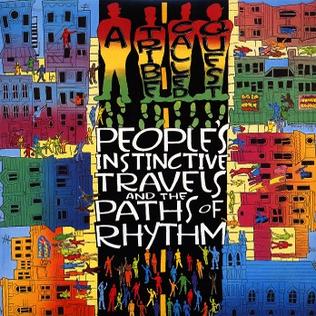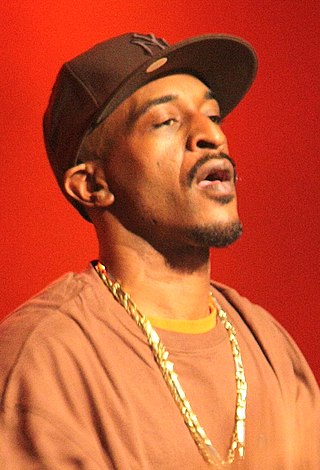
A Tribe Called Quest was an American hip hop group formed in Queens, New York City, in 1985, originally composed of rapper and main producer Q-Tip, rapper Phife Dawg, DJ and co-producer Ali Shaheed Muhammad, and rapper Jarobi White. The group is regarded as a pioneer of alternative hip hop and merging jazz with hip hop, influencing numerous hip hop and R&B musicians.
The Native Tongues were a collective of late 1980s and early 1990s hip-hop artists known for their positive-minded, good-natured Afrocentric lyrics, and for pioneering the use of eclectic sampling and jazz-influenced beats. Its principal members were the Jungle Brothers, De La Soul, A Tribe Called Quest, Monie Love, and Queen Latifah. The collective was also closely tied to the Universal Zulu Nation. Rolling Stone cites the track "Doin' Our Own Dang" as "the definitive Native Tongues posse cut".

The Universal Zulu Nation is an international hip hop awareness group formed by electro/hip hop artist Afrika Bambaataa.

The Five-Percent Nation, sometimes referred to as the Nation of Gods and Earths (NGE/NOGE) or the Five Percenters, is an Afro-American Nationalist movement influenced by the Nation of Islam that was founded in 1964 in the Harlem section of the borough of Manhattan, New York City, by Clarence 13X, who was previously known as Clarence Edward Smith.

Midnight Marauders is the third studio album by American hip hop group A Tribe Called Quest, released on November 9, 1993, by Jive Records. Recording sessions for the album occurred at Battery Studios, Platinum Island Studios and Scorcerer Sound in New York City. Its production was mainly handled by Q-Tip, with contributions from Skeff Anselm, Large Professor and the group's DJ, Ali Shaheed Muhammad. A culmination of the group's two previous albums, People's Instinctive Travels and the Paths of Rhythm and The Low End Theory, it features an eclectic, gritty sound based on jazz, funk, soul and R&B samples, in addition to socially conscious, positively-minded, and humorous lyrics.

People's Instinctive Travels and the Paths of Rhythm is the debut studio album by American hip hop group A Tribe Called Quest, released on April 10, 1990, on Jive Records. After forming the Native Tongues collective and collaborating on several projects, A Tribe Called Quest began recording sessions for People's Instinctive Travels in late 1989 at Calliope Studios with completion reached in early 1990. The album's laid back production encompassed a diverse range of samples which functioned as a template for the group's unorthodox lyrics.

William Michael Griffin Jr., better known by his stage name Rakim, is an American rapper. He is one half of golden age hip hop duo Eric B. & Rakim, with whom he released four albums: Paid in Full (1987), Follow the Leader (1988), Let the Rhythm Hit 'Em (1990), and Don't Sweat the Technique (1992). He also released four solo albums: The 18th Letter (1997), The Master (1999), The Seventh Seal (2009), and G.O.D.'s Network: Reb7rth (2024).
Wreckx-n-Effect is an American new jack swing group from Harlem, New York City. They are perhaps best known for their 1992 single "Rump Shaker", which peaked at number two on the Billboard Hot 100.

Kamaal Ibn John Fareed, better known by his stage name Q-Tip, is an American rapper, record producer, singer, and DJ. Nicknamed the Abstract, he is noted for his innovative jazz-influenced style of hip hop production and his philosophical, esoteric and introspective lyrical themes. He embarked on his music career in the late 1980s, as an MC and main producer of the influential alternative hip hop group A Tribe Called Quest. In the mid-1990s, he co-founded the production team The Ummah, followed by the release of his gold-certified solo debut Amplified in 1999. In the following decade, he released the Grammy Award-nominated album The Renaissance (2008) and the experimental album Kamaal the Abstract (2009).

Beats, Rhymes and Life is the fourth studio album by American hip hop group A Tribe Called Quest. Released on July 30, 1996, by Jive Records, it followed three years after the highly regarded and successful Midnight Marauders. Produced by The Ummah, the album is a departure from the joyful, positive vibe of the group's earlier albums and is regarded as their darkest album in content. It debuted at number one on the Billboard 200 and was certified platinum by the Recording Industry Association of America (RIAA) on October 27, 1998.

Ali Shaheed Muhammad is an American hip hop DJ, record producer, rapper and bass guitarist, best known as a member of A Tribe Called Quest. With Q-Tip and Phife Dawg, the group released five studio albums from 1990 to 1998 before disbanding; their final album was released in 2016. He was also a member of the R&B group Lucy Pearl, and is known in recent years for his jazz collaborations with producer Adrian Younge.

Golden age hip hop refers to hip hop music created from the mid or mid-late 1980s to the early or early-mid 1990s, particularly by artists and musicians originating from the New York metropolitan area. A precursor to the new-school hip hop movement, it is characterized by its diversity, quality, innovation and influence on overall hip hop after the genre's emergence and establishment in the old-school era, and is associated with the development and eventual mainstream success of hip hop. There were various types of subject matter, while the music was experimental and the sampling from old records was eclectic.
Taqwacore is a subgenre of punk music dealing with Islam, its culture, and interpretation. Originally conceived in Michael Muhammad Knight's 2003 novel, The Taqwacores, the name is a portmanteau of "hardcore" and the Arabic word "taqwa" (تقوى), which is usually translated as "piety" or the quality of being "God-fearing", and thus roughly denotes reverence and love of the divine. The scene is composed mainly of young Muslim artists living in the US and other Western countries, many of whom openly reject traditionalist interpretations of Islam, and thus live their own lifestyle within the religion or without.

Michael Muhammad Knight is a white American novelist, essayist, journalist, and convert to Islam. His writings are popular among American Muslim youth. The San Francisco Chronicle described him as "one of the most necessary and, paradoxically enough, hopeful writers of Barack Obama's America," while The Guardian has described him as "the Hunter S. Thompson of Islamic literature," and his non-fiction work exemplifies the principles of gonzo journalism. Publishers Weekly describes him as "Islam's gonzo experimentalist." Within the American Muslim community, he has earned a reputation as an ostentatious cultural provocateur.
Larry Welsh, also known as Lakim Shabazz, is a former hip-hop emcee artist who was one of the founding members of the original version of the Flavor Unit crew. His stage name refers to the so-called Lost Tribe of Shabazz, which is based on the teachings of Wallace Fard Muhammad.

Masjid Malcolm Shabazz, formerly known as Mosque No. 7, is a Sunni Muslim mosque in Harlem, New York City. It was formerly a Nation of Islam mosque at which Malcolm X preached, until he left it for Sunni Islam in 1964.
African-American Muslims, also known as Black Muslims, are an African-American religious minority. African-American Muslims account for over 20% of American Muslims. They represent one of the larger Muslim populations of the United States as there is no ethnic group that makes up the majority of American Muslims. They mostly belong to the Sunni sect, but smaller Shia and Nation of Islam minorities also exist. The history of African-American Muslims is related to African-American history in general, and goes back to the Revolutionary and Antebellum eras.
Wakeel Allah is an American author, and a member of the Nation of Islam. He is best known for his books In the Name of Allah: A History of Clarence 13X and the Five Percenters Vol. 1, and his subsequent book In the Name of Allah: A History of Clarence 13X and the Five Percenters Vol. 2.

Conrad Bennette Tillard is an American Baptist minister, radio host, activist, politician, and author.












